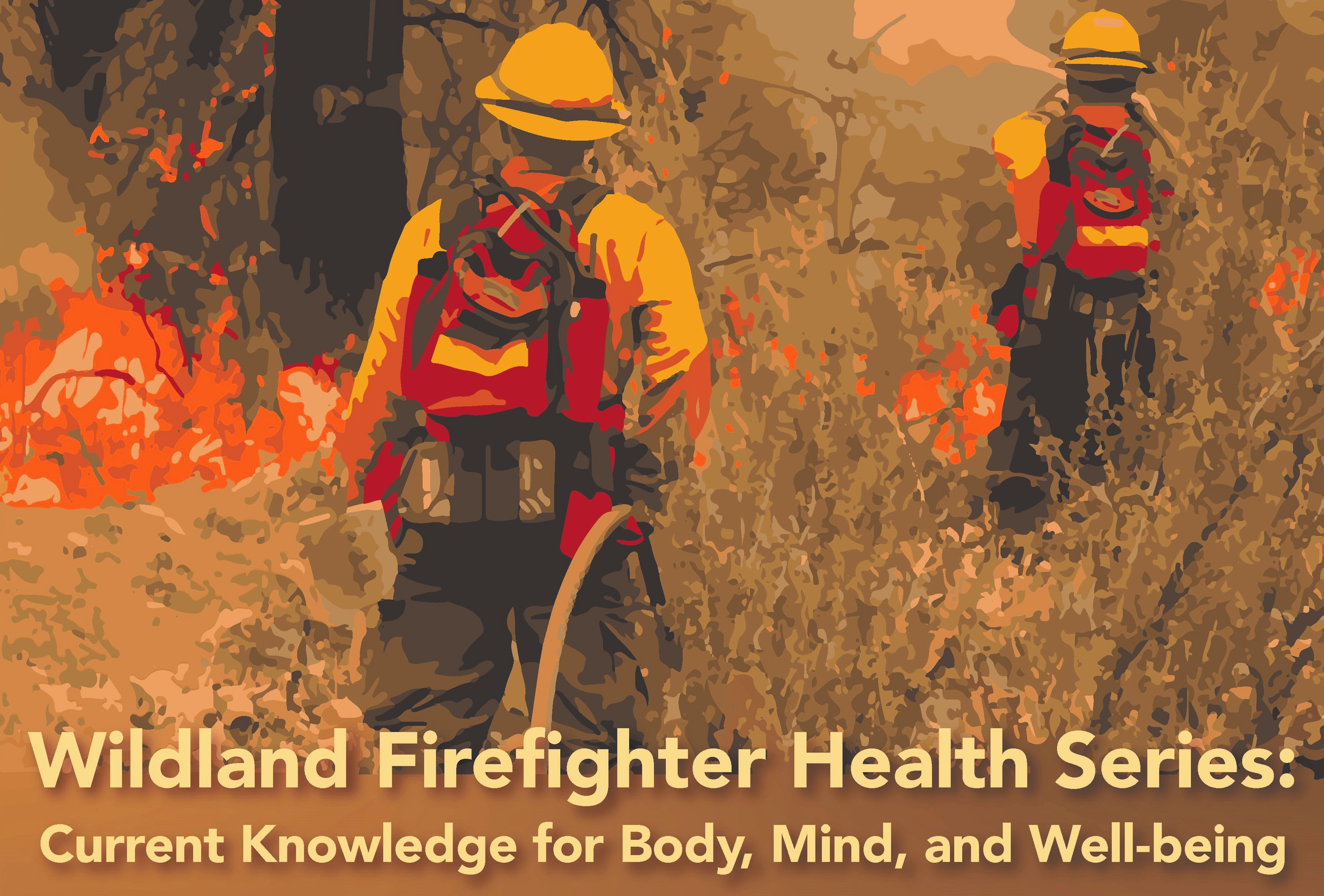During this 3-day series of presentations and panel discussions, professionals and agency leaders shared some of the current science, knowledge, and tools available to support wildland firefighter physical and mental health. The series aimed to bring the latest science to those working in fire management and/or wildland firefighting.
Presentations | Resources Recommended by Speakers | Get Help
Event Overview
Wildland firefighters experience a wide range of physical and mental health stressors while on the job that can lead to short and long-term health issues. Physical and mental health impacts are intermingled and may include prolonged smoke exposure, decreased reproductive health, sleep deprivation, and chronic injuries. Experiences of firefighters in dangerous situations can also lead to trauma, depression, and substance abuse. The schedule demands of being away from family for long periods and working long shifts under difficult conditions with others also creates unique challenges. The impacts of these health concerns on individuals, and the greater wildland firefighter profession, are receiving increased attention from government agencies, researchers, health professionals, and the wildland firefighter community. Many of the resources and publications referenced during this event are available on our Wildland Firefighter Health Hot Topic Webpage.
Presentations
Day 1 Recorded Presentations: Physical Health
- Smoke Exposure and Health Effects for Wildland Firefighters – Kathleen Navarro
- Female Firefighters and Reproductive Health: What We Know and Where We Are Going – Alesia Jung
- Sleep Matters: How it Affects Mental and Physical Health – Randy Brooks
- Wildland Firefighter Physiological Health and Job Demands – Joe Sol
- Fitness Leadership: Management Perspective – Luis Gomez
Day 2 Recorded Presentations: Mental Health
- Wildland Firefighter Mental Health - Patty O’Brien
- PTSD: Finding a Way Home – Marc Titus
- Taming Fire Dragons - Suzanne Connolly
- Identification and Integration of Moral Injury – Rebecca Morris
- Stress First Aid for Wildland Firefighters – Kimberly Lightley
Day 3 Recorded Presentations: Supporting a Healthy Workforce
- Recognizing Risk Factors in the Workplace – Matt Carroll
- Active Bystander and Preparedness Training – Ty Gilbert
- Building Resilience – Ben Iverson
- Overview and Practical Application of Incident Kits – K.C. Briggs
- NWCG Efforts for Wildland Firefighter Health – Miranda Stuart
Resources Recommended by Speakers
Kathleen Navarro:
- Article: Exposure to Particulate Matter and Estimation of Volatile Organic Compounds across Wildland Firefighter Job Tasks. 2021. K. Navarro et al.
- Article: Working in Smoke: Wildfire Impacts on the Health of Firefighters and Outdoor Workers and Mitigation Strategies. 2020. K. Navarro.
- Article: Wildland firefighter smoke exposure and risk of lung cancer and cardiovascular disease mortality. 2019. K. Navarro et al. (associated NRFSN Research Brief)
- Web article with links: Department of Labor announces streamlined claims process for federal firefighters with certain occupational illnesses. April 2022. Department of Labor.
Alesia Jung:
- Article: Anti-Müllerian Hormone Levels among Female Firefighters. 2022. S. Davidson et al.
- Article: Maternal and Child Health Among Female Firefighters in the U.S. 2018. S.A. Jahnke et al.
- Infographic: Reproductive Health & the Fire Service. 2021. References available here.
Joe Sol:
- Article: Total Energy Intake and Self-Selected Macronutrient Distribution During Wildland Fire Suppression. 2020. A. Marks et al.
- Article: Seasonal changes in wildland firefighter fitness and body composition. 2020. S.E. Gaskill et al.
- Article: Metabolic Demand of Hiking in Wildland Firefighting. 2018. J.A. Sol et al.
Ty Gilbert:
- Web article: Don’t be a Bystander. Be an Active Bystander! 2019. Maria Estrada.
- Website: Wildfire Lessons Learned Center including the 1996 TriData study on Wildland Firefighter Safety Awareness.
- Web article: Is Yours a Learning Organization? March 2008. Garvin et al. Harvard Business Journal.
Ben Iverson:
- Book: The Power of Full Engagement. 2003. J. Loehr and T. Schwartz.
- Course: Resilience. Human Performance Institute.
K.C. Briggs:
- Website: Incident Kits - Behavioral Health and Employee Wellbeing
- Website: Firefighter Stress Management
Miranda Stuart:
- Website: NWCG Mental Health Subcommittee. Mental health resources for wildland firefighters.
- Course: Wildland Firefighter Mental Health part of RT-130, Wildland Fire Safety Training Annual Refresher (WFSTAR)
- Website: Behavioral Healthcare Provider Directory for Emergency Responders.
Get Help
- NWCG Mental Health Subcommittee
Mental health resources for wildland firefighters. - Suicide Prevention Lifeline
1-800-273-8255, 24/7 confidential support or Text “MHA” to 741-741 - Need to talk to someone? (Warmline directory)
A warmline is a phone number you call to have a confidential conversation with someone who can provide support during hard times. - National Sexual Assault Hotline
1-800-656-4673, 24/7 confidential support - RAINN Sexual Assault Resource Directory
Online chat & other resources - USDA FS Harassment Reporting Center
(844) 815-8943 Open 7 days a week from 7:00 a.m. to 11:00 p.m. (Eastern Time) - Substance Abuse and Mental Health Services Administration
https://www.samhsa.gov/find-help/national-helpline
1-800-662-4357, 24/7 National Helpline and treatment referral service - Findtreatment.gov
Directory of state-licensed providers who specialize in treating substance use disorders.
Presented as a partnership among the Northern Rockies Fire Science Network, the Northwest Fire Science Consortium, the Great Basin Fire Science Exchange, the Southern Rockies Fire Science Network, and the California Fire Science Consortium.
This event was organized with agenda input provided by the USDA Forest Service’s Innovation & Organizational Learning RD&A and Work Environment & Performance Office, and inspiration derived from the International Association of Wildland Fire’s Workforce Resilience Ignite Talks.
Recording(s)
Event Details
May 31 2022, 11am - 1:30pm
Jun 1 2022, 11am - 1:30pm
Jun 2 2022, 11am - 1:30pm
Contact(s)
Cory Davis
cory.davis@umontana.edu
Vita Wright
vita.wright@usda.gov
